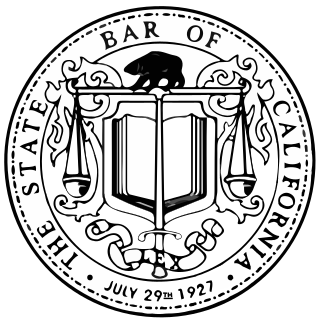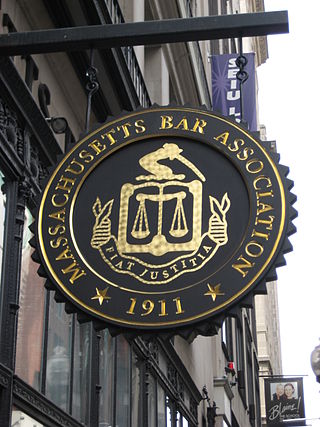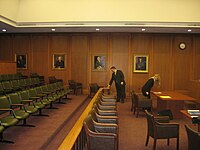A bar association is a professional association of lawyers as generally organized in countries following the Anglo-American types of jurisprudence. The word bar is derived from the old English/European custom of using a physical railing to separate the area in which court business is done from the viewing area for the general public.

A law school in the United States is an educational institution where students obtain a professional education in law after first obtaining an undergraduate degree.

Legal education is the education of individuals in the principles, practices, and theory of law. It may be undertaken for several reasons, including to provide the knowledge and skills necessary for admission to legal practice in a particular jurisdiction, to provide a greater breadth of knowledge to those working in other professions such as politics or business, to provide current lawyers with advanced training or greater specialisation, or to update lawyers on recent developments in the law.

Admission to the bar in the United States is the granting of permission by a particular court system to a lawyer to practice law in the jurisdiction. Each U.S. state and jurisdiction has its own court system and sets its own rules and standards for bar admission. In most cases, a person is admitted or called to the bar of the highest court in the jurisdiction and is thereby authorized to practice law in the jurisdiction. Federal courts, although often overlapping in admission standards with states, set their own requirements.
A paralegal, also known as a legal assistant, or paralegal specialist is a professional who performs tasks that require knowledge of legal concepts but not the full expertise of a lawyer with a license to practice law. The market for paralegals is broad, including consultancies, companies that have legal departments or that perform legislative and regulatory compliance activities in areas such as environment, labor, intellectual property, zoning, and tax. Legal offices and public bodies also have many paralegals in support activities using other titles outside of the standard titles used in the profession. There is a diverse array of work experiences attainable within the paralegal field, ranging between internship, entry-level, associate, junior, mid-senior, and senior level positions.

The American Bar Association (ABA) is a voluntary bar association of lawyers and law students; it is not specific to any jurisdiction in the United States. Founded in 1878, the ABA's stated activities are the setting of academic standards for law schools, and the formulation of model ethical codes related to the legal profession. As of fiscal year 2017, the ABA had 194,000 dues-paying members, constituting approximately 14.4% of American attorneys. In 1979, half of all lawyers in the U.S. were members of the ABA. The organization's national headquarters are in Chicago, Illinois, and it also maintains a significant branch office in Washington, D.C.
A Master of Laws is an advanced postgraduate academic degree, pursued by those either holding an undergraduate academic law degree, a professional law degree, or an undergraduate degree in a related subject. In most jurisdictions, the LL.M. is the advanced professional degree for those usually already admitted into legal practice.
A bar examination is an examination administered by the bar association of a jurisdiction that a lawyer must pass in order to be admitted to the bar of that jurisdiction.

The State Bar of California is California's official attorney licensing agency. It is responsible for managing the admission of lawyers to the practice of law, investigating complaints of professional misconduct, prescribing appropriate discipline, accepting attorney-member fees, and financially distributing sums paid through attorney trust accounts to fund nonprofit legal entities. It is directly responsible to the Supreme Court of California; however, its Trustees are now appointed by the Supreme Court, the California Legislature, and Governor of California. All attorney admissions are issued as recommendations of the State Bar, which are then routinely ratified by the Supreme Court. Attorney discipline is handled by the State Bar Office of Chief Trial Counsel, which acts as prosecutor before the State Bar Court of California.

A law school is an institution or professional school specializing in legal education, usually involved as part of a process for becoming a judge, lawyer, or other legal professional within a given jurisdiction.

A state bar association is a bar association that represents or seeks to represent the attorneys practicing law in a particular U.S. state. Their functions differ from state to state, but often include administration of the state bar examination for admission of attorneys to practice law, regulation of continuing legal education and other requirements, collection and monitoring of attorney client trust accounts, collection of fees and discipline of attorneys for ethical or other violations. Some state bars also provide services for members such as maintaining a directory of attorneys in the state, facilitating networking and social events for attorneys, publishing a bar journal and providing classes to fulfill these CLE credits requirements.
An admission to practice law is acquired when a lawyer receives a license to practice law. In jurisdictions with two types of lawyer, as with barristers and solicitors, barristers must gain admission to the bar whereas for solicitors there are distinct practising certificates.
A personal injury lawyer is a lawyer who provides legal services to those who claim to have been injured, physically or psychologically, as a result of the negligence of another person, company, government agency or any entity. Personal injury lawyers primarily practice in the area of law known as tort law. Examples of common personal injury claims include injuries from slip and fall accidents, traffic collisions, defective products, workplace injuries and professional malpractice.

The College of the State Bar of Texas is an honorary society of qualified lawyers who are interested in both high ethical standards and improved training for all Texas attorneys.
In the law of the United States, admission on motion refers to a procedure by which an attorney admitted to practice in one state or territory may obtain admission to practice in another state or territory without having to sit for the other jurisdiction's bar examination. Therefore, attorneys seeking admission on motion can be admitted to a jurisdiction without having to undergo any additional testing, except where the Multistate Professional Responsibility Examination ("MPRE") is required. Instead, applicants simply file a motion or application with the state supreme court, board of bar examiners, or state bar association of the other jurisdiction, which typically must be accompanied by certificates of good standing from all other jurisdictions in which they are admitted and sufficient personal information to facilitate a background check of good moral character.
Board certification is the process by which a physician or other professional demonstrates a mastery of advanced knowledge and skills through written, oral, practical, or simulator-based testing.

The Law Society of Alberta (LSA) is the self-regulating body for lawyers in Alberta, Canada, established in 1907 which derives its authority from the Legal Profession Act of the Government of Alberta.
The Alaska Bar Association is a mandatory bar association responsible for the Alaska Supreme Court and for the admission and discipline process of attorneys for the state of Alaska.
The State Bar Association of North Dakota (SBAND) is the integrated (mandatory) bar association of the U.S. state of North Dakota.

The Inter American University of Puerto Rico, Faculty of Law is the school of law of the Inter American University of Puerto Rico, a private co-educational corporation accredited by the Middle States Association of Colleges and Schools, the Puerto Rico Council of Higher Education, and the Commonwealth of Puerto Rico Department of Education. The School of Law is approved by the American Bar Association (ABA) and is located in San Juan, the capital city of Puerto Rico. Since its founding, the School of Law has succeeded in meeting the needs of the legal profession, in particular, and Puerto Rico's society in general.








